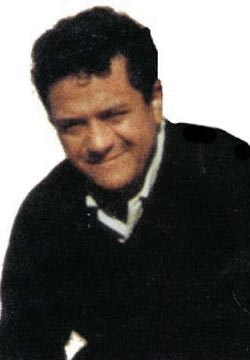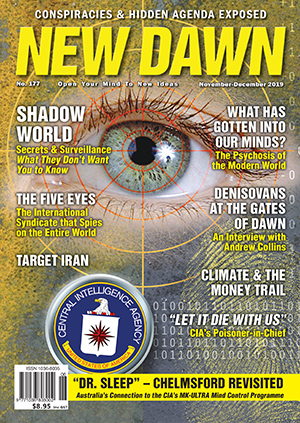From New Dawn 177 (Nov-Dec 2019)
…in the darkness charlatans are easily mistaken for sages.
– Chantal Delsol
There’s something fundamentally wrong with how the world is right now. Don’t you see it – feel it? We are a species with noble character, with a great spirit, and with a sacred soul. In our hearts we wish only for the betterment of all people; for love and justice and communion. And yet what we see going on in the world is nothing less than complete madness. We have to say it exactly as it is – there is a sickness going on, and this pathogen is spreading on a vast scale.
We live in a world where economic greed overrides all other factors. Nations, corporations, and individuals commit horrendous acts that include impoverishment, deprivation, psychological and physical torture, and even murder, just for financial gain. We behave horrendously toward each other; there is constant bullying and harassment upon all social and cultural levels. Violence is endemic across the globe, and pharmaceutical corporations would rather turn a profit than support health and well-being. Governmental bodies and agents participate in drug trafficking on a huge scale in order to both make money as well as promote addiction amongst the masses. Rich individuals and corporations hide their money through illegal offshore schemes rather than contribute to the welfare of their communities. People in high office consistently abuse, harass, and violate people within their power as a sign of their high status. The health of the planet and its natural environment is constantly mistreated and polluted; again, mostly for the sake of economic gain. And the list goes on.
We have entered the third millennium, and we pride ourselves on being an inventive and intelligent species. We have probed off-planet and have allegedly placed people on the moon. We are now planning trips further afield into the solar system and of having people live on the planet Mars. We are an incredibly creative and compassionate species. So, what is wrong? Why do so many people so much of the time adhere to thinking and ways of behaviour that is nothing short of insanity? Why is everything so seemingly upside-down?
The reason, I propose, is that we are not living within our right minds. That is, we have ‘lost’ our minds to a collective psychosis that seeks to imbue us with a traumatic mind. This is no flight of fantasy. There are indeed indigenous and wisdom teachings that tell of a mental force that exists in the collective consciousness field that came to usurp our minds. Various traditions refer to these nefarious mindsets as wetiko, predators, archons, Ahriman, the flyers, and more. They speak of how an ‘alien mind’ has entrapped and traumatised the human collective mind.
Another side of this story is that as a global species, we are also projecting the wounds of our collective unconscious out into the world. This is both a traumatic as well as cathartic process. Perhaps it is necessary – a collective cleansing of our unconscious traumas and of the shadows that lurk in the dark recesses of our minds – to prepare our species for the next phase of our evolution? What we can be sure about, without a doubt, is that we are amidst a great, historical transition. At this time, two major issues confront us: the seeming madness of the modern world, and the need to find meaning within it.
What’s Going On?
The question we are confronted with is a collective one, and it concerns us all. Why are so many of us, our fellow humans, behaving so badly? And not only badly, but in a way that is detrimental to our own well-being. It would seem more than strange, verging on the insane, that any creature would wish to deliberately harm its own environment and support systems. Yet for us humans, we have the significant added factor of being conscious of our actions, and self-conscious in our reflective understanding. So, again, we ask – what has gotten into our minds?
Modernity (and post-modernity) has given us the perspective that anything that is important lays external to us. The attitude of this ‘modern mindset’ to the external world has largely been one of hostility – we have been conquering the external world for the greater part of recent history, instead of mastering our own inner nature. Whatever we project externally eventually becomes our sense of reality; therefore, if we have inherited a corrupted collective mind, then we are projecting a tarnished collective reality. Modern life has attempted to reinterpret the human condition, and this has resulted in a separation from our need to seek essential inner meaning in our lives. Progress may alleviate some of our suffering and pains, yet it shall never compensate for the lack of fulfilment we feel inside, for this requires metaphysical or transcendental nourishment.
Any notion of the spiritual, or the metaphysical, is often considered not essential to our daily life, and we are taught to dismiss it. Modernity’s task was thus seen as freeing us from the illusions of transcendence. And in its place, we have been conditioned (a.k.a. programmed) with a form of thinking opposing a genuine path of human psychic development. In this regard, I now consider the hypothesis that a mental infection (a psychosis) has entered the collective human mindset.
I examine this proposition from four different cultural contexts: indigenous Native American, western psychology, Central American shamanism, and European theosophy. And I have given it my own name – the Wounded Mind. First, I turn to the indigenous Native American tradition.
The Wetiko Virus
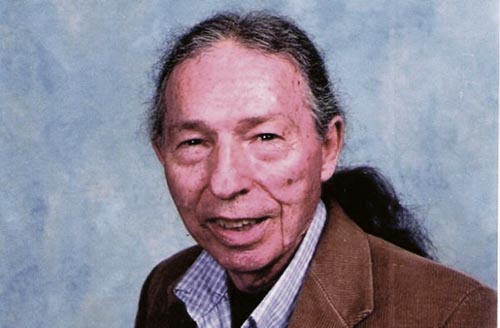
Jack Forbes (1934–2011), a Native American scholar and activist, long considered this question of what has gotten into the human mind – and came up with an answer for it. After long study, he came to the conclusion that humanity is suffering from a specific disease, a psychosis:
For several thousands of years human beings have suffered from a plague, a disease worse than leprosy, a sickness worse than malaria, a malady much more terrible than smallpox… whatever we call it, this disease, this wetiko (cannibal) psychosis, is the greatest epidemic sickness known to man.1
Wetiko is a Cree term (windigo in Ojibway, wintiko in Powhatan) that refers to an evil person or spirit which terrorises other creatures by means of terrible acts. And in Forbes’ view, the great tragedy of humankind is that our history for the past two thousand years has largely been a tale of the psychosis of the “wetiko disease” as he calls it. He goes as far back as to include the Egyptians, Babylonians, and Assyrians as cultures that helped to spread the wetiko disease throughout the Middle East. Afterwards, it was the Macedonians and Greeks under Alexander who spread it still further until it finally landed in the lap of the Roman Empire who, according to Forbes, really expanded the wetiko infection.
What he is saying here is that this psychosis is a particular mindset that took form as certain hierarchical cultures and civilisations began to grow. And in order to maintain control, power, and to further bloody expansion, this mindset was deliberately cultivated, encouraged, and then developed as the dominant perspective and narrative. In fact, it was a crucial perspective that had to be propagated in order to maintain all status quo power structures within a developing culture. To not adhere to this specific mindset almost certainly meant annihilation and eradication in the face of other competing cultures (as was the case with Forbes’ inherited Native American ancestral cultures).
Forbes’ view is that the wetiko disease has so corrupted European thinking that wetiko behaviour is now regarded as the very fabric of European culture and the pursuit of progress. And in order for the ruling few to maintain stable power and order, they must convince, persuade, or condition the masses within their society/civilisation to either believe and support the same, or at the very least not to rebel against it. The functioning of our modern societies has been derived from this operation of providing a dominant mindset – or social narrative – and manipulating its collective consent through coercion or, as is now more the case, persuasive propaganda.
Forbes comes to the conclusion that a developed society takes the wetiko desire for power and channels it into creating highly disciplined and rigid structures that over the years have managed to conceal their controlling mechanisms through institutionalised conditioning. These institutions then go on to create an established ‘pecking order,’ or hierarchical status, between people. This ranking social status system continues to exploit the general population through more socially ‘normalised’ means. Innocent or non-conscious wetikos can also be co-opted into this system of behaviour through allurements such as grants, support, employment, etc., which entices them into the illusion of individual freedom and personal power. Like any other pathogen, the wetiko virus tries to infect and feed upon others by reinforcing its own corruption of the human mind.
The predatory nature of wetiko can lurk under almost any guise and is most prevalent in such slogans as ‘patriotism’, ‘profit-seeking’, and ‘protecting our way of life’. We could say that we have seen recent examples in ‘you’re either with us or against us’. The wetiko mindset assimilates itself through intensive propaganda programs designed to perpetuate its own self-serving values. In the end, many of our national cultures have become pervaded by myths, narratives, and entrained thinking patterns that perpetuate a wetiko society. Yet what if such a mindset is not only preserved within particular cultures but is available to be assimilated through a species collective mindset? This is the question posed by the psychoanalyst and psychologist Carl Gustav Jung.
Jung’s Collective Unconscious
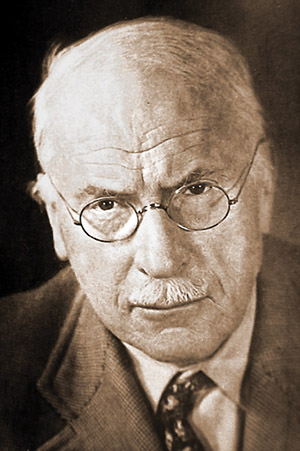
Jung was perhaps the first psychologist to fully realise that what we see playing out upon the global stage is largely a projection, or symptom, of the unconscious psyche of humanity. Jung considered that this collective unconscious does not develop individually but is inherited. That is, we inherit a ‘psychic life’ that is filled with ‘occurrences’ that stretch back to earliest beginnings. What if a psychosis, such as the wetiko pathogen, has already invaded this psychic stratum and now manifests as a disturbance in the field of humanity’s collective unconscious? We could very well be dealing with a psycho-pathogen – that is, a mind virus – that infects our individual minds from the underlying collective realm.
This collective psychosis functions as a field phenomenon, and as such it underlies the entire collective field of nonlocal consciousness. The danger here is that each person can potentially be infected by the psychosis simply by not being mindful of their thoughts. Before we know it, we are having malicious or angry wetiko-like thoughts, which then could easily manifest into actual behaviour. Who at one time or another hasn’t had a mean or nasty thought? The question is – did this thought originate within us, or did it enter from without? Since the mind virus pathogen – which I refer to as the Wounded Mind – is a nonlocal phenomenon, then it is possible we all are infected with it to varying degrees. Or, it may be more accurate to say that this mind has us. And the worst of it is that most people will be unconscious and unwitting carriers of this pathogen. As Jung said, “Wars, dynasties, social upheavals, conquests, and religions are but the superficial symptoms of a secret psychic attitude unknown even to the individual himself.”2
If we take the modern analogy of computing, then it is similar to how a virus would enter our computers and install malware or change the coding. Such a mental pathogen would act in the same way by installing its own malware program in our minds. For most of the time we are unaware of it, as it acts alongside our own ‘normal’ mind until a time when it takes over almost completely. Over time our own mental make-up – our psychological state – would adapt the foreign ‘invader’ and assimilate it into its own functioning as a way of normalisation. In other words, we would eventually come to consider it as our mind.
Don Juan’s Alien Mind
There are wide-ranging accounts throughout shamanic and anthropological literature about how people are vulnerable to psychic invasion and predatory ‘energy forces’. In recent times, perhaps no-one has been as openly explicit as the teachings given by don Juan through the books of Carlos Castaneda. Later in the series of books, when Castaneda is more experienced and matured into the shamanic path, don Juan reveals some ‘truths’ to him regarding the nature of the predators. Don Juan explains that there are “outside forces” that impose control upon us. These ‘predators’ imprison human beings and make us docile. When Castaneda protests against this, don Juan explains that:
In order to keep us obedient, meek and weak, the predators engaged themselves in a stupendous maneuver – stupendous, of course, from the point of view of a fighting strategist. A horrendous maneuver from the point of view of those who suffer it. They gave us their mind! Do you hear me? The predators give us their mind which becomes our mind. The predators’ mind is baroque, contradictory, morose, and filled with the fear of being discovered any minute now… Through the mind, which after all, is their mind, the predators inject into the lives of human beings whatever is convenient for them.3
According to don Juan, an ‘alien’ presence, or energy, has infiltrated the human mind. That is, when ‘we’ are thinking, or ‘having’ thoughts, we are in effect manifesting – or being influenced by – a corrupted mind that is “baroque, contradictory, morose” and filled with fear. When we connect and engage with the collective unconscious, or the collective mindset, are we, in fact, tapping into a psyche that, in the words of Jung, stretches “right back to the earliest beginnings”? Yet those beginnings may also include the ‘alien mind’ of the predator.
As a species, humanity accesses a collective unconscious mind that forms the basis of our thinking patterns and our behavioural traits. If an element of psychosis, trauma, a dominating narrative – i.e., wetiko, predator – has infiltrated this collective mental field then it is a very real possibility that we too have inherited what I call the Wounded Mind. It also raises the question of what type of civilisation or society would such a parasite-predator psychotic ‘mind’ wish to create?
The answer to this may lie with a form of twentieth-century theosophy that was put forward by the Austrian philosopher and mystic Rudolf Steiner.
The Coming of Ahriman
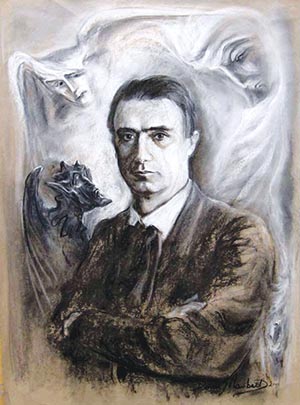
In the writings of Rudolf Steiner in the early part of the twentieth century, he makes mention of an entity he calls Ahriman. For Steiner, this Ahriman is a supersensible being that wishes to distract humanity from aligning with its evolutionary potential. In order to accomplish this, it seeks to influence the minds of humanity in order to develop along a specific path; one that aligns with its own needs rather than that of humanity’s.
The conditions that the Ahrimanic presence wishes to create includes the following: a materialistic, mechanical conception of the universe; a rational-materialistic based scientific dogma; an economic view of social dynamics and systems; a strong feature of nationalism and national identities; the popularity of separatist party politics; the prevalence of fundamentalism in religious dogma; and the dominance of an arid, dry intellectual culture.4 It would appear that this Ahrimanic presence has been quite successful so far!
Steiner was also explicit in stating that the most dangerous aspect of Ahriman is for this presence to go unrecognised for it seeks to be hidden (similar to the predators). Steiner, in one of his lectures, stated: “…think of everything that presses us down upon the earth, that makes us dull and philistine, leading us to develop materialistic attitudes, penetrating us with a dry intellect, and so on: there you have a picture of Ahrimanic powers.”5
The Ahrimanic powers, we are told, have a firm intention to get the human domain, as well as the earth, into their sphere of power, and to make human beings dependent upon their control. Again, it sounds eerily familiar. Steiner tells us that Ahriman intends to conceal from us that modern intellectual, rationalistic science, is a great illusion, a deception. The idea, apparently, is to keep us all so dulled with our materialistic paradigms that we have no inclination or urge to go seeking for knowledge concerning “soul and spirit in the cosmos.”
The Ahrimanic powers use everything at their disposal to seed discontent, disarray, and conflict. They manipulate notions of heredity – family, race, tribe, peoples – to create confusion and division. Through these class structures, they enforce the dominant cultural paradigm of economic and material needs. Steiner warns his listeners that the “Ahrimanic incarnation” will be greatly advanced if people fail to develop an independent life of the spirit.
A Few Words of Recognition
In all the examples described here – indigenous Native American, western psychology, Central American shamanism, and European theosophy – we have had a glimpse of the proposition of what I term the Wounded Mind. The source of this trauma, however, is still unclear and open for debate. It may be either a collective psychosis of civilisation, a predatory invasion, a devolutionary impulse/presence, or a combination of these. Or else it may be something other but with similar aspects. Yet whatever may be the root cause, it is still quite clear that a traumatic presence lingers within the collective psyche of humanity, and it needs to be recognised for what it is – and expelled.
Perhaps the traumas we are seeing inflicted upon the world today are part of this expulsion – a sort of public exorcism. In the end, we will need to curtail these ‘foreign impulses’ in order to evolve toward a better future for us as a human species upon this planet.
Kingsley’s book Healing the Wounded Mind: The Psychosis of the Modern World and the Search for the Self (Clairview Books), is available from here and all good bookstores.
Footnotes
1. Jack D. Forbes, 2008 (rev). Columbus and other Cannibals, Seven Stories Press, xvi
2. Cited in Meredith Sabini (ed), ed. 2008. C.G. JUNG on Nature, Technology & Modern Life, North Atlantic Books, 188
3. Carlos Castaneda, 1999, The Active Side of Infinity. Thorsons, 220
4. R. Steiner, 2009, The Incarnation of Ahriman: The Embodiment of Evil on Earth, Rudolf Steiner Press
5. Ibid, 1
© New Dawn Magazine and the respective author.
For our reproduction notice, click here.



